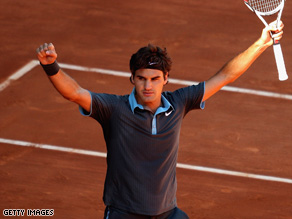
Should Roger Federer win the French Open title on Sunday his prize will be worth less in U.S. dollars than that of Rafael Nadal’s in 2008.
Although organizers increased the winner’s prize at Roland Garros by €60,000 this year, recession-driven fluctuations in the Euro – U.S. dollar exchange rate means the men’s and women’s winner’s prizes in U.S. currency ($1.48 million) have actually shrunk by almost $100,000 compared to last year. Right across the four Grand Slam events — the Australian Open, U.S. Open, Wimbledon and French Open — comparative prize pools have been affected by volatile exchange rates, largely caused by the recession. The value of this year’s Wimbledon tournament has also crashed in U.S. currency, while the Australian Open — last year’s poorest Grand Slam — could soon be the richest across the U.S., British and European currencies. The Australian Open offered the smallest winners’ prize check of the four majors in 2008, however, at today’s exchange rates, the 2009 prize is currently the richest in the game (although the amount of the 2009 U.S. Open winner’s check is yet to be announced). Organizers of the 2009 tournament increased the prize to $2 million Australian dollars — which is today about U.S.$1.55m. The value of the tournament in pounds has soared from £614,500 to £981,200, and in Euros the winner would today receive 1.11 million — up from 822,600 at the 2008 tournament.
Don’t Miss
The 10 greatest upsets in men’s tennis
Interactive: Test the bounce of a ball on clay
Top seed Safina reaches French Open final
Kuznetsova lines up all-Russian showdown
It is not all bad for the value of the weekend’s French Open tournament, either, depending on where you take your money. The pound has taken a hammering in the last year, and as a result the French Open winner’s prize is now worth £135,000 more in Britain than it was in 2008. Should Switzerland’s Roger Federer manage to win the tournament, he may be wise to take the money to Britain and hope the exchange rate improves. Of course, he would still be 60,000 euros better off in Europe, too. Director of the Center for the International Business of Sport (CIBS) at Coventry University, Professor Simon Chadwick, told CNN the impact of exchange rates on sports prizes and wages had been largely underestimated. “I think there are many subtle influences of the downturn and the exchange rate is one of those.” Chadwick said volatile exchange rates are unlikely to cause players to turn away from tournaments like Wimbledon as it has a huge prize pool and great history, but, for smaller tournaments it is “a real issue.” “With prize money you are trying to attract the best players, and if the prize money pots are reduced … it really does undermine the appeal of those competitions,” he said.